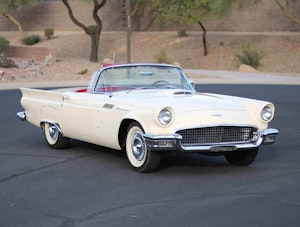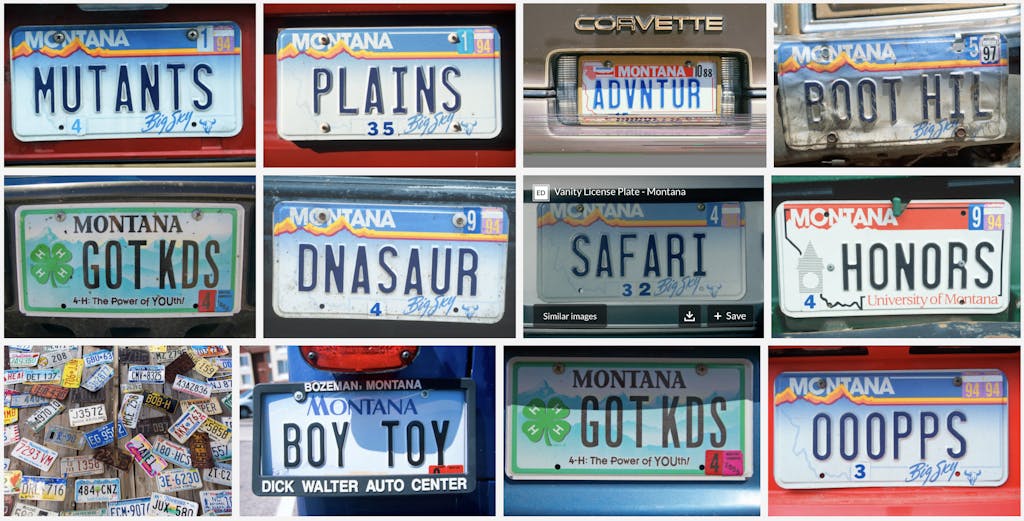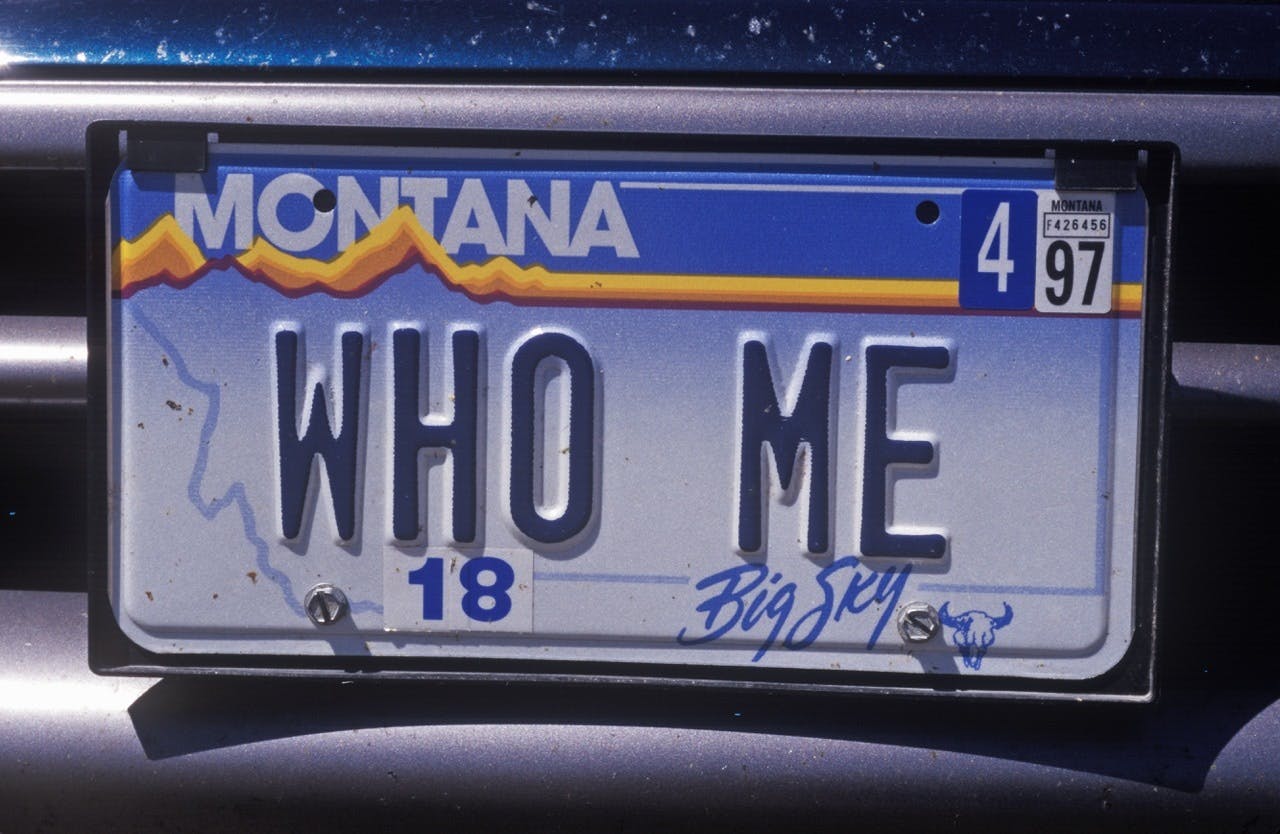Media | Articles
The Montana License Plate Loophole, Explained
There’s a certain legal loophole from our 41st state, Montana. It lets you avoid the taxes, fees, and DMV dealings of registering a vehicle in your own state, saving headaches and potentially tens of thousands of dollars in the process. It seems like a great deal, but there’s more to it than that. As Montana plates have gotten both more popular and more notorious in recent years, some states are cracking down. A case from California grabbed attention this summer, but people with Montana plates have gotten in trouble from coast to coast. So how does it work? And what is the current state of things for this collector-car life hack?
How It Works
If you’ve just purchased a $300,000 Lamborghini, McLaren, or motorhome, and plan to keep and use it in the state where you reside, you’ll need to pay sales tax in that state. In Texas, that can be up to 8.25 percent. In California, it can be over 10, and in Louisiana over 12. There are also registration fees and, depending on where you live, safety inspections and emissions testing. But wait, there are other extras, too. In Massachusetts, for example, there is “motor vehicle excise tax,” an annual bill calculated at $25 per $1000 of your vehicle’s value, determined by the “percentage of the manufacturer’s list price in the year of manufacture.” Georgia has a “Title Ad Valorem Tax” (TAVT), which is a one-time payment at 7 percent of the “fair market value” of the vehicle at time of registration, and California has an annual “Vehicle License Fee” (VLF) based on the vehicle’s value as well.

All of the above are by far the least enjoyable part of a car purchase. The Montana loophole is one way to get around it. It’s much, much cheaper. We’re talking hundreds of dollars instead of potentially tens of thousands. It’s simpler, too. It really can be easier to register a vehicle halfway across the country than it is at your DMV down the street.
Every state has a different tax structure, with some elements more attractive than others. Texas and Florida, for example, have no state income tax. Montana (along with Alaska, Delaware, New Hampshire, and Oregon) has no sales tax. But Montana also doesn’t have state vehicle safety or emissions inspections. There are no use or excise taxes, either. For vehicles 11 years old or older, you can even get a permanent registration there. No renewals necessary. To get a Montana title/registration/plate in your name you’d still need to be a Montana resident, but what you can do instead is form a limited liability company (LLC) that is technically domiciled in Montana, and have that LLC buy and register the vehicle. Then you have your own company car, MT plates and all, to drive around along with thousands of extra bucks in your bank account. The car never needs to turn a wheel in Montana, or even in the same time zone.
Sounds complicated, but it really isn’t. A Montana LLC doesn’t have to sell, make, or even do anything, really. You could form it solely for the purpose of registering a car to save you money. You could even register more cars under that same LLC without having to form a new one. And while there are some complications and paperwork on the Montana side of things, there are plenty of people in that state who are more than happy to help you, for a small fee.
Marketplace
Buy and sell classics with confidence

There’s a whole cottage industry of firms in Montana (many are law firms, but not all) that will act as your “resident agent” or “registered agent” and will form the LLC, register the vehicle, and act as the Montana-based agent for your company as required by state law. These firms have catchy names like “$1 Montana,” “All Day $49 Montana,” “Montana Tags” and “LLC TLC,” just to name a few.
There’s enough business to go around, apparently. According to reporting by Montana newspaper The Missoulian, 30,000 LLCs were registered there in 2021. To be fair, not all of those were for vehicle registrations, but compare that to Oregon, where fewer than 55,000 LLCs were registered in the same period despite Oregon having quadruple the population.
Problems and Pitfalls
For Montana, the whole non-resident LLC and car registration thing works out great. The state pulls in revenue from vehicle registrations, but they’re from vehicles that never enter the state. They don’t wear down Montana roads. It’s also all perfectly legal from Montana’s point of view. And “The Treasure State” is bringing in a lot of, well, treasure. As of 2023, vehicle registrations were the fourth largest source of tax revenue in Montana for the state general fund.
Not all of that comes from non-residents but, unsurprisingly, Montana has more vehicles registered per capita than any other state, by a long way. Montana has a population of 1.123 million, barely more than itty-bitty Rhode Island, but according to Bureau of Transportation Statistics data, as of 2021 Montana has nearly twice as many vehicles registered as it does human beings. At more than 1.9 vehicle registrations per person, Montana’s rate is well over twice the national average of 0.85 vehicles per person.

The problems with the Montana loophole arise when vehicles registered there run afoul of the laws in the states where those vehicles are actually kept and used. For many states, once a vehicle is within its borders for 30 days, it legally needs to be registered and titled there, fees and all. If you live, buy, and keep a vehicle in a state with sales tax, then sales tax must be paid. If you use a Montana LLC and drive your car on MT plates, then, your state has missed out on tax revenue that could be going to roads, schools, parks, and other infrastructure.
On the other hand, using the Montana loophole is more defensible in the world of actively used RVs, where Montana plates are popular because a nice motorhome can cost as much as a house. Their owners may not physically reside or keep the RV in one state full-time, so individual state registration requirements may not apply. Otherwise, a more legally supportable way to use the Montana loophole is if the vehicle is stored in a state other than the owner’s residence, and if it never stays in their resident state long enough for that state’s legal residency requirements kick in. As far as insurance issues go, it’s best to follow the law and, when in doubt, consult with an attorney.
The loophole doesn’t just strain other states. There are actually some pitfalls back in Montana, too. Clerks at smaller counties there have gotten overwhelmed trying to process an influx of non-resident car registrations. “We were getting backlogged, especially during tax season”, a county attorney in Anaconda told The Missoulian last year, and that a local company “would send in a secretary with 100 of these vehicles to be registered. So we ran into a situation where we’re not going to register 100 vehicles while people stack up behind you and normal people wait.”
The company even sued, wanting an order from the district court to handle registrations in an “expeditious manner.” There are also reports that at one time Missoula County had a full-time staff member dedicated to nothing but non-resident vehicle registrations. In 2021, Montana even saw its license plate production disrupted due to an aluminum shortage. Supply chain shakeups from the pandemic got most of the blame, but shipping thousands of new plates out of state can’t have helped matters, either.
Risks and Crackdowns
Several major crackdowns on owners with Montana plates, slapped with major fines and back taxes, have made headlines. Given the small number and seemingly erratic nature of enforcement from the states, it seems like the chances of getting in trouble are pretty low, but John Draneas, attorney and author of the “Legal Files” column at Sports Car Market, feels otherwise: “I think it’s a mistake to say the risk of getting caught is low. If you think about it, any time the DMV or the cops want to, they could go to any big car gathering in Southern California and bust God knows how many people.” Indeed, Draneas feels that the risk of using the Montana loophole is getting higher, as the scheme has become more well-known. “Any kind of special-interest or collector car with a Montana plate, it’s pretty obvious what you’re doing. You’re exposed if you ever take that car out in public,” he says.

And you’re not just exposed if the authorities happen to be around. California Highway Patrol, which points out that the state “loses millions of dollars a year in revenue from California residents who register their vehicles in other states,” has a program in which anyone can report out-of-state plates to the authorities (Colorado and Arizona have similar systems).
Draneas recently covered a case in California, in which an owner had a California state investigator and two sheriff’s deputies show up to his house with a search warrant authorizing them to search his garage (where he kept his Montana-plated sports car) and seize his cell phone. They told him he was violating a California law requiring him to register his car in the state and pay a use tax, and to expect penalties and charges to follow. There are reportedly a number of other California residents under investigation for the same thing, “all by the same state investigator, who is said to have a strong personal interest in combating Montana-licensed cars.” And these are just ones we’ve heard about. Enforcement may be more common than we realize because, as Draneas points out, “people don’t talk about it much when they get caught.”
Other notable crackdowns include one in late 2018, when the Georgia Department of Revenue compiled a list of cars that had a Peach Pass (Georgia’s toll road tag) but also had Montana registrations, then built profiles of where the cars had been and how long they had been in Georgia. The investigation and subsequent crackdown then focused on two individuals who had dozens of cars registered with Montana LLCs, and the lead investigator notes that monitoring the cars’ appearances on social media played a pivotal role in building a case.
Back in 2010, Massachusetts cracked down on Montana-plated RVs. The state’s Office of the Inspector General, Department of Revenue, and Registry of Motor Vehicles (RMV) “investigated a small sample of RVs purchased with Montana LLCs . . . the preliminary investigation has collected nearly $200,000 and led to enforcement action that has billed errant taxpayers for hundreds of thousands of dollars in taxes and fees.” The investigation identified 23 Montana LLCs with 32 vehicles registered to them, and at the time cited that Montana had an LLC for every 19 residents in that state, while Massachusetts only had an LLC for every 83 residents. Two years before that, in Colorado, the Attorney General’s Office and Revenue Department obtained misdemeanor tax evasion convictions against 12 RV-owning residents who had used the Montana loophole to avoid paying Colorado taxes, and the Revenue Department took civil action on more than 100 other residents for a total of $2.7M in unpaid sales taxes, penalties, and interest.

Ten years ago, a court case in Louisiana regarding the Montana loophole, Thomas v. Bridges, made news. Thomas had formed a Montana LLC, solely to avoid sales tax in Louisiana (the nation’s highest) on an RV he purchased in that state for $351,800. By doing that he avoided paying over $30K in taxes and fees to his home state. He also kept the RV at a property he owned in another state, Mississippi. The Louisiana Department of Revenue went after him (but not his LLC, crucially) for unpaid taxes, a total of $46,509.60 including penalties. Thomas eventually brought the matter before a Louisiana district court, which ruled in Thomas’ favor. The case went all the way up the chain to the Louisiana Supreme Court, which also found in Thomas’ favor, as the Department of Revenue’s case was against him personally, and not his LLC, which technically bought and owned the RV. However, two of the justices concluded with calls for legislative action that would address the use of out-of-state LLCs to avoid taxes on purchases made in Louisiana.
The Montana loophole is getting riskier because it’s better known than ever. And, as everyone these days has a camera in their pocket and most are eager to post pictures of cool cars to social media, it’s more visible than ever, too. There can be clear benefits to the whole thing, but as the old Latin saying goes, caveat emptor.



















It’s different in every state. Does anybody know how this is affecting people in Arizona for instance?
Funny how all these cars pictured are on Houston Car Spotters. I’ve seen many cars that are obviously purchased with those with the means to easily pay the taxes but they register them in Montana a state that the car will never visit.
Having said that having a website so citizens can snitch on their neighbors isn’t cool. Let the police do their work and pull the car over. It’s just scummy.
To belong to a private club – a local Country Club or Tennis Club or your hometown Elks or Eagles or even the Legion or the Vets, you have to join up and
pay your annual dues. So that your club can pay the light biĺl and fix the roof when it leaks. If your home R.E. taxes are too high, move to a smaller house in a less
prestigious neigborhood. If the plates and
registration on a Corvette are too high, buy
a CHEVette. If it’s just too expensive to live
in New York or California then just move
to Montana and leave the rest of us alone.
But if you just can’t bear to leave NY or CA
then pay your dues. Don’t put some BS
“Big Sky” plate on your ride and think you
can use the highways where you reaĺly
domicile. And now I’m wondering about
Hagerty and how they feel about you
claiming your car resides in Missoula
when it never leaves Mamaroneck on
crime riddled Lon Gisland.
wow –
Someone needs a geography lesson. Mamaroneck is not on Long Island. <a,aroneck is in Westchester. Sheesh.
Switching gears but sales tax on vehicles I always thought to be a scam. Every owner paying sales tax every time the car sales here in Kansas and other states I’m certain. So if you buy a $50k SUV and sell it in a year or two for say $40k, then it sells again for $30, again for $25k again for $15-20k and again for $10k and lastly maybe $5k here in Kansas that equates to a conservative $17,500 in sales tax over probably a 15 year period on the same vehicle. Unless you trade it in then trade in value is deducted from your sales tax. I’m just saying collecting sales tax over and over on the same item seems well stupid. Then we pay outlandish annual registration and propert tax on top of that. It was $900 I think on our last new SUV just to tag it and $5k in sales tax. The wife and I average about $2500 a year just to keep tags on our vehicles. Didn’t somebody once say overtaxation and under or mis representation? Montana you say hmm. Seriously though was already aware long before the article and still pay my dues. Just don’t have to like it!
Same in Pennsylvania, tax on sale to you, taxed again to the next buyer and so on.
Here in Pennsylvania to try to register a vehicle without a title is impossible or will cost you money and maybe even 2 years and then no gaurantee that you will get a title. The Vermont Loophole was great for getting it titled with a bill of sale and a verified VIN check. Most people would then apply for a PA title. That closed 2 years ago i think. So the new way is Montana, odd thing is people can register side by side offroad vehicles and try driving them on the streets here and in NJ. Although the argument is that in Montana its considered a legal form of transportation, it causes nothing but headached back here. People flying around in these vehicles that do not meet any safety requirements.
It’s not always about taxes. The (now closed) Vermont loophole was to enable registration of cars that technically could not be registered in other states. In PA, if you don’t have a title, you are not going to be able to register a vehicle. PERIOD. So if you found the proverbial farmer’s field find, which no one has claimed for 50 years, got a bill of sale from the property owner, and then tried to register it, good luck. In my case, I like to collect odd 50cc bikes. A lot of states treat these as mopeds, and don’t register or title them. I bought a couple, and with the bill of sale the license plate gods (small g) of PA said no way. Prior to closing the VT loophole, three got vermont plates. The last two, well, I have an interest in a property in SC, so was able to register them there. The point is, states do stupid things, don’t apply logic, and then wonder why otherwise law abiding citizens circumvent the stupid law.
Interesting article. It reminds me of another problem that is increasing in many states…high property taxes on personal homes. Allowing city/county/state governments to tax personal home dwellings gives those governments a legal lever in which to take your property if you do not pay those taxes using the other property you have YOUR money. I believe that there should be a type of fair taxes where all taxes, are paid at the point of sale. You don’t pay taxes unless you buy something. Real estate, automobiles, & trucks would be exempted. Once Congress sets that federal tax rate, it would politically very hard for Congress to repetitively raise taxes after that. And that would be a good thing to control the growth of government.
STOP! Shame on you Hagerty for writing this junk. Rules are made; people will always find a way to navigate. You are not in their shoes; do what you think is right, or do what you think is just. Welcome to America. You can choose to leave.
Wow what a great read and well written article. Amen to the regressive sales tax comment. The more one has the less it hurts. I am not fond of paying taxes but do like to drive my cars around not worrying if I am going to need to explain why my plates are from a different state if/when I get pulled over. Render unto Caesar what is Caesar’s….
Connecticut has a nice classic vehicle “loophole”. In CT cars are taxed at the same rate as houses. However, if the car is 20 or more years old it can be registered as a “classic vehicle”. These cars have a maximum taxable value of $500. The ’55 MB 300 SL Gull Wing I’ve seen on the interstate is taxed as if it were worth $500.
South Dakota has a similar program…You’ll see lots of RV’s with SoDak plates.
I have never understood the personal property tax argument. I make a lot of money and reward myself by buying an expensive car(s) and I get taxed for the privilege of owning it, after I have already paid a whopper tax bill for titling tax (based off purchase price), and after my earnings have already been taxed at the highest tax bracket. How much sense does that make? One day the wealthy upper middle class ($350k-1.5million/year) is going to wake up and take their due!
What do they expect? Ever increasing fees for registration and the tax on the purchase are driving people broke. Here in Maryland the legislature just raised the bi-annual car registration by 70%. Yeah! 70%. And they say corporations are gouging????
So many of these comments read like whiny children. “I want to enjoy all the benefits of living in this specific location but I don’t want to contribute at all to maintaining the things that brought me here.”
You want Montana taxes? Go live in Montana.
You want to live in Southern California? Georgia? Then pay up.
Why is this so hard? Stop acting like the only option is dodging taxes that you agreed to when you decided to live there. You don’t get to just ignore the laws you don’t like.
I feel like George Constanza yelling “We live in a society!” but there is no bass line to underscore how absurd these dingbats are.
I’ve visited Montana, and I love it. The nature, the fishing, the summers — all awesome. Winters not so much.
Gavin Newsom’s parents live in the Bitterroot Valley in Montana and he visits them and would know how to register a car there.
However, the point of this article is invalid — Montana does not welcome out-of-state registrations. You must have valid residency (a driver’s license is valid proof) and vehicle insurance. The rules are quite strict so the article presents a tax problem which is tiny ….. yes, tiny. Oregon has no state sales tax but they have strict residency requirements also.
The article is mischievous.
And if you own a ‘collector’ vehicle or two, as I do, and you drive less that 1500 miles per year in each, you still get a full hit on the reg. fees. No break considering you don’t pollute as much and you certainly don’t ‘wear out the roads’ like a normal vehicle/pickup plying the Interstate. Considering the condition of our roads in California, I wonder where all that money…along with the gas taxes…goes. But don’t get me started on that topic!